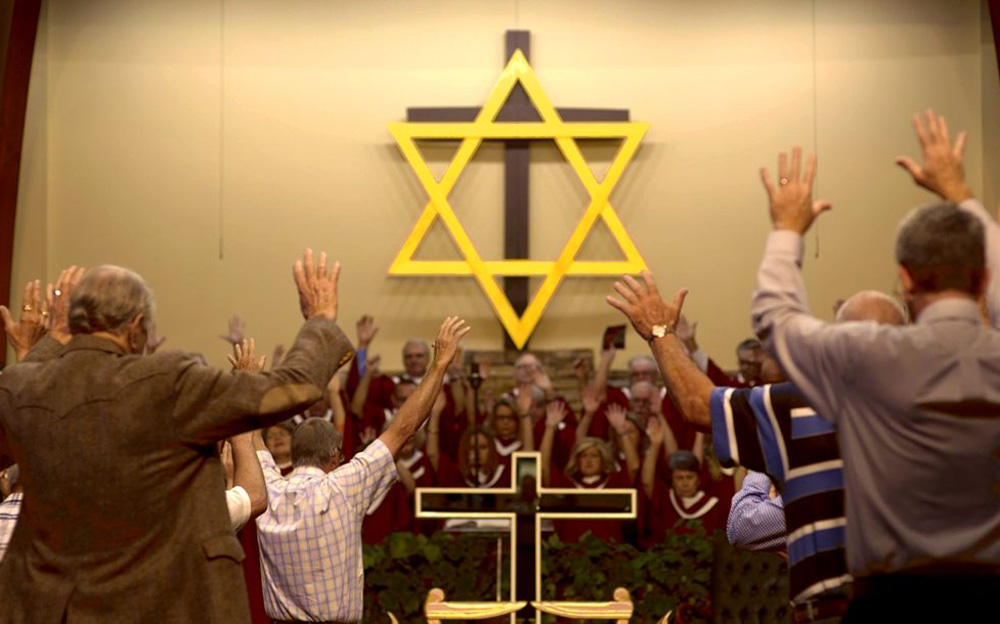Boyd Bingham IV isn’t the first person who you’d imagine to be a friend of Israel, although that’s clearly what led director Maya Zinshtein to the backroads of Middlesboro, Kentucky where the pastor is introduced taking target practice with a semi-automatic rifle in “Til Kingdom Come.” In an off-day from the Binghamtown Baptist Church, started by his grandfather W.B. and where his father William continues to be a minister, Bingham can be seen having fun in one of the only ways you can when commerce has largely left the town behind. Still, even with money tight amongst his congregation, this hasn’t prevented Bingham from emptying out the donation plate time and again to give to the International Fellowship of Christians and Jews, an organization spearheaded by Rabbi Yechiel Eckstein during the 1980s that takes in $129 million from American evangelicals annually.
“Til Kingdom Come” doesn’t deny that some of this money is going to good works, as the Fellowship has provided housing to the displaced and shipments of food provided to the less fortunate and elderly, but of course, the evangelicals’ support comes at the expense of other Christians — those in Palestine who maintain that the West Bank is their home and that Israel has long sought to evict. While Zinshtein finds an arrangement that’s all about heaven for the evangelicals, who believe support of the Jews is the best way to protect the holy land of Jerusalem which will eventually be ground zero for the rapture, she details an alliance that has created hell on earth, uniting the conservative wings of two religions completely at odds in their beliefs yet oddly compatible in how they believe, patiently acting in their own self-interests to fulfill what scripture has told them about end times.
That long game resulted in the relocation of the American Embassy in Israel from Tel Aviv to Jerusalem, legitimizing Israel’s claims to the territory after decades of intense lobbying that largely fell on deaf ears until this current U.S. administration and the director wisely sets up “Til Kingdom Come” as a multi-generational tale, not only in how a partnership formed on the fringes came to become a central preoccupation, but also drawing a parallel between the youngest Bingham, who has sought to deepen support to the Fellowship even when his own community is increasingly living under the poverty line, and Yael Eckstein, who is being groomed to take over her father’s place at the Fellowship and overseeing a billion-dollar war chest. Naturally, something’s curious about this redistribution of wealth from the rural church to the global enterprise of the Fellowship, but Zinshtein takes the intrigue even further as she builds a compelling case for how blind faith in apocalyptic prophecy has taken precedence over the here and now, interrogating the hypocrisy and willful ignorance towards the tenets of their faith that may be inconvenient in the desire to gain political power.
At one point, Eckstein suggests she’s comfortable with the arrangement when she can “relate to 99% of what Christians say,” acknowledging “only the end is different and only one can be right,” and while “Til Kingdom Come” obviously can’t be around to see that reckoning, it brings out another as it illustrates a win-at-all-costs mentality amongst religions as they’ve become increasingly aligned with political interests, perhaps broadening coalitions but ultimately with the aim of shutting others out. There’s remarkable cynicism in such calculations, but as “Til Kingdom Come” illuminates there’s a new testament being written right before our eyes prizing political expediency above all else and rather than the unlikely union of evangelical Christians and orthodox Jews suggesting peace ahead, the strange bedfellows are cause to keep the rest of the world awake at night.
“Til Kingdom Come” will stream through DOC NYC from November 11th through 18th.




